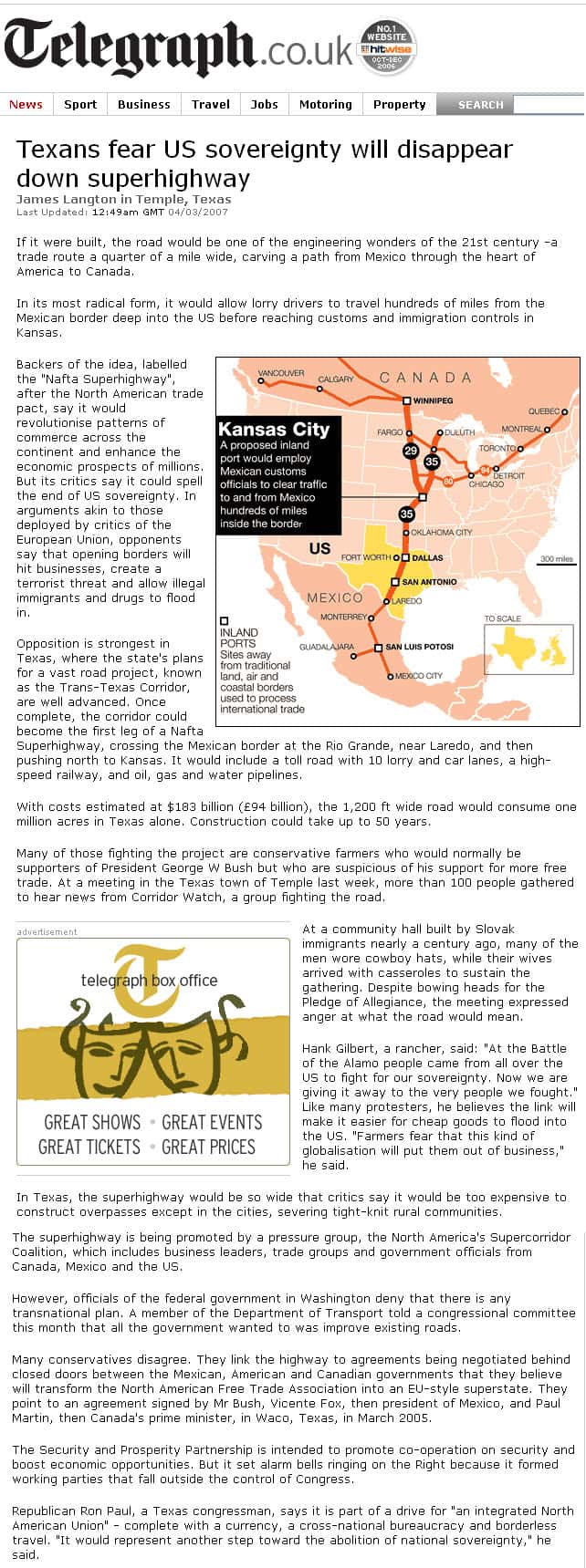Texans fear U.S. sovereignty will disappear down superhighway
If it were built, the road would be one of the engineering wonders of the 21st century — a trade route a quarter of a mile wide, carving a path from Mexico through the heart of America to Canada.
In its most radical form, it would allow lorry drivers to travel hundreds of miles from the Mexican border deep into the US before reaching customs and immigration controls in Kansas.
Backers of the idea, labelled the NAFTA Superhighway,
after the North American trade pact, say it would revolutionise patterns of commerce across the continent and enhance the economic prospects of millions. But its critics say it could spell the end of US sovereignty. In arguments akin to those deployed by critics of the European Union, opponents say that opening borders will hit businesses, create a terrorist threat and allow illegal immigrants and drugs to flood in.
Opposition is strongest in Texas, where the state’s plans for a vast road project, known as the Trans-Texas Corridor, are well advanced. Once complete, the corridor could become the first leg of a NAFTA Superhighway, crossing the Mexican border at the Rio Grande, near Laredo, and then pushing north to Kansas. It would include a toll road with 10 lorry and car lanes, a high-speed railway, and oil, gas, and water pipelines.
With costs estimated at $183 billion (£94 billion), the 1,200-foot-wide road would consume one million acres in Texas alone. Construction could take up to 50 years.
Many of those fighting the project are conservative farmers who would normally be supporters of President George W. Bush but who are suspicious of his support for more free trade. At a meeting in the Texas town of Temple last week, more than 100 people gathered to hear news from Corridor Watch, a group fighting the road.
At a community hall built by Slovak immigrants nearly a century ago, many of the men wore cowboy hats, while their wives arrived with casseroles to sustain the gathering. Despite bowing heads for the Pledge of Allegiance, the meeting expressed anger at what the road would mean.
Hank Gilbert, a rancher, said: At the Battle of the Alamo people came from all over the US to fight for our sovereignty. Now we are giving it away to the very people we fought.
Like many protesters, he believes the link will make it easier for cheap goods to flood into the U.S. Farmers fear that this kind of globalisation will put them out of business,
he said.
In Texas, the superhighway would be so wide that critics say it would be too expensive to construct overpasses except in the cities, severing tight-knit rural communities.
The superhighway is being promoted by a pressure group, the North America’s Supercorridor Coalition, which includes business leaders, trade groups, and government officials from Canada, Mexico and the US.
However, officials of the federal government in Washington deny that there is any transnational plan. A member of the Department of Transport told a congressional committee this month that all the government wanted to was improve existing roads.
Many conservatives disagree. They link the highway to agreements being negotiated behind closed doors between the Mexican, American and Canadian governments that they believe will transform the North American Free Trade Association into an EU-style superstate. They point to an agreement signed by Mr Bush, Vicente Fox, then president of Mexico, and Paul Martin, then Canada’s prime minister, in Waco, Texas, in March 2005.
The Security and Prosperity Partnership is intended to promote co-operation on security and boost economic opportunities. But it set alarm bells ringing on the Right because it formed working parties that fall outside the control of Congress.
Republican Ron Paul, a Texas congressman, says it is part of a drive for an integrated North American Union
— complete with a currency, a cross-national bureaucracy and borderless travel. It would represent another step toward the abolition of national sovereignty,
he said.

